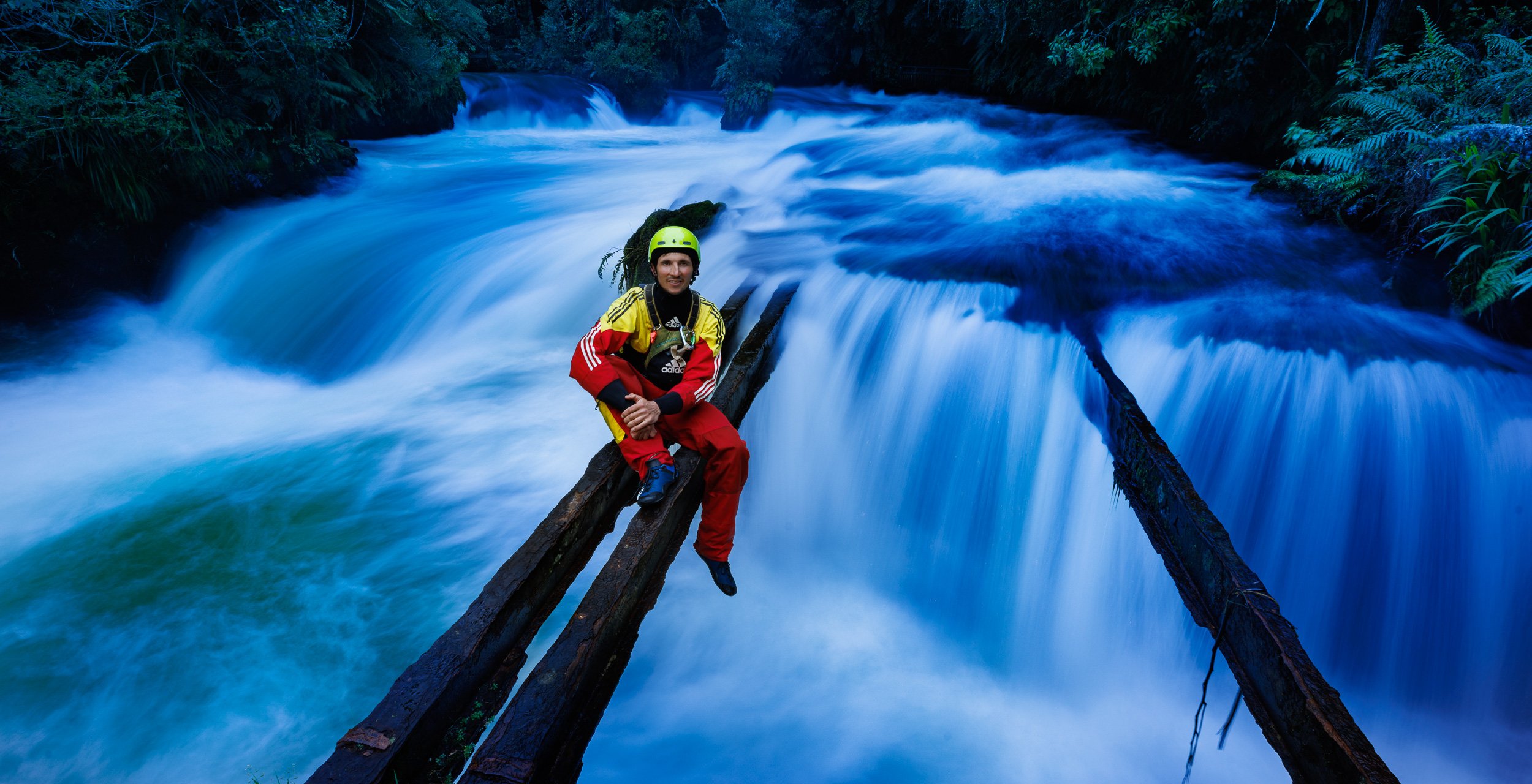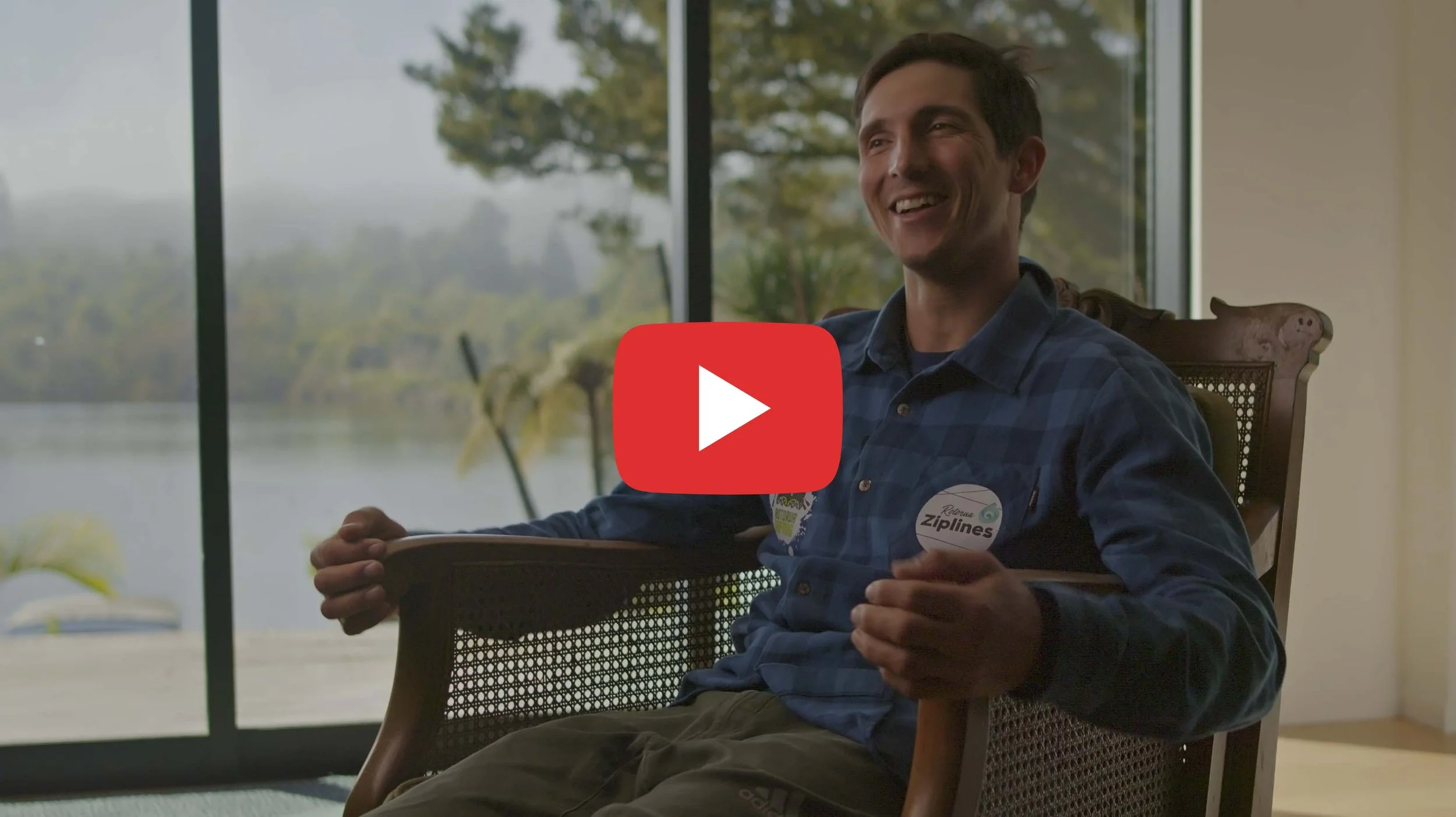
Sam Sutton
Action man Sam, the ultimate adrenalin junkie
Words Jill Nicholas
Pictures/video Stephen Parker
Challenge Sam Sutton to categorise himself and he’s as challenged as we are.
That’s because the sum of his action man parts equates to multiple categories, each with an inter-connecting story line.
At 34, he’s claimed the world champion extreme kayaker title four times, has been an international adventurer, marketed locally designed kayaks across Europe, is an entrepreneurial businessman, owns a rafting company, is a passionate conservationist and a bloke who’s built four ziplines and much of his family’s home.
It’s at Okere Falls, as are the two businesses he’s founded – Rotorua Rafting in 2011 and Rotorua Ziplines. The latter opened this past May and is billed as our region’s latest eco adventure.
It’s not accidental his home and ventures are based where they are. It’s where Sam Sutton grew up. He’s steadfast in his belief the Okere awa (river) has dictated his life path. The Okere awa is quite well known as the Kaituna River, it’s an amazing playground.
“It’s where my brother [Jamie] and I spent our childhood. It was awesome, there were only three permanent homes. We would go out into the bush, get lost and have to figure out how to get home in time for kai.
“Our teen years were spent playing in the awa. What it’s taught me has pretty much formed my life path. It is the life force that’s given me the skill set to travel the world and explore business avenues.”
Visiting his whakapapa
Before Sam escorts us down those avenues we learn his connection is not restricted to Okere Falls, it’s to the he wider region and is deep rooted. His late maternal kuia, Rangiuira (Rangi) Briggs, was Murupara-born with iwi affiliations to Te Arawa and Tuwharetoa. She became a pioneering woman leader of several Maori land trusts and a two-term district councillor. They were roles for which she was awarded a Queen’s Service Medal.
British by birth, his maternal grandfather, Fred Briggs, fought alongside Maori at Gallipoli. It was they who inspired him to settle in New Zealand. He was one of Rotorua’s early electricians, installing the town’s first traffic lights.
Sam’s dad, Neil Sutton, is a qualified lawyer who changed course, spending much of his working years as a forestry contractor. His mother, Patti Sutton, taught at Western Heights High for more than four decades
With such historical and childhood links, it’s unsurprising Sam wanted his three children to grow up were he did. His partner, German born and raised Kathryn Uhl, shared his enthusiasm. They met while she was working at the Okere Falls Store, then owned by her uncle and aunt.
As a couple they travelled extensively as Sam pursued his kayaking and its spin-off business enterprise, Whaka Kayaks. It was when older daughter Lily, now 10, was approaching school age that Okere became their permanent home – at least permanent for now.
Sam’s not convinced his travelling days are done; he views them as being on pause. He was 18 and still a schoolboy when they began.
Living the dream
In 2006 he was placed second in the world junior extreme kayak champs in the US. “That was pretty awesome.” You can say that again, Sam.
Out of school there was a brief spell working at Red Stag mill before his wanderlust really kicked in.
“Once winter descended on Aotearoa I was off to Uganda. The idea was to get my skill set up, the Nile has massive rapids there.” Next stop North America and casual rafting guide work.
He won his first Adidas extreme kayak world champs on Austria’s tortuous Oezel Arche (river) in 2010.
Adidas were impressed, becoming his official sponsor. “They paid me a salary; that enabled me to further my travels. I started travelling the world [white water] kayaking and living the dream. I was camping and living out of the back of a van before it was trendy on Instagram.”
Adventures he’s encountered on his travels would turn Indiana Jones an envious pea green.
“I’ve been in some tricky situations. A mate of mine was eaten by a croc in the Congo. In south Mexico we were confronted by guerrilla warfare. They were against deforestation so I guess they were okay.
“In Siberia there are Mongolian Russians who will kill you off to get their hands on alcohol. A gang of them came after my Russian mate’s vodka. We had to jump in the river to flee. We paddled to the Chinese border, you can’t get into China so we had to be picked up by a Russian helicopter. It cost about $20,000, I think Adidas paid. That was a good trip, eh?”
Goal - always win
At the risk of stating the obvious white water kayaking isn’t for the faint hearted.
“I have used up a lot of my lives kayaking. Twenty five of my friends have died.
That grim statistic failed to deter him. He powered his way to world kayaking top spot for two successive championships after his initial victory, making him the first in the world to win the international title there years on the trot.
He took another tilt at the worlds in 2016 but dipped out by 100th of a second. The following year he secured redemption.
It’s his sheer guts and determination that have got him to the top of such a potentially lethal sport. Goal-setting is his motivation.
“A lot of people are very good and get to the final. My goal was always to win. I think it is critical to set a goal for anything you decide to do. You want to destroy everybody, dominate, otherwise I don’t think you will make it.”
The 2017 worlds were always going to be his last international hurrah.
“I knew my life span as a professional kayaker wouldn’t be super long so I needed to have an exit plan early on.”
Business acumen harnessed
He established Rotorua Rafting in 2011. “It gave me the freedom to raft half the year, shut the business down in winter and travel for the other six months.”
Towards the end of the company’s first season his long-time Okere Falls mate, Kenny Mutton, invited Sam to market the Whaka Kayaks Mutton designed here and manufactured in Europe.
“They started off being manufactured in the Czech Republic then moved to northern Italy . . . the lunch was far better there.”
Rotorua Rafting’s beginnings were, in Sam’s words, “humble”.
“We operated from the local camping ground. We had two rafts and a $5000 van.”
The company operates on the Okere and Kaituna awa and takes adrenalin junkies over the seven metre Tutea Falls, the world’s highest commercially rafted falls.
In 2019 and 2020 TripAdvisor’s Travellers’ Choice section voted the company into the top spot across three categories. This included best visitor experience in the South Pacific.
But all hasn’t been smooth paddling. Wet winters, such as they one just gone, have forced river closures.
To circumvent this Sam Sutton began to cast about for a new venture that thrill seekers would find equally enticing.
Zipline cogs set in motion
In 2018 plans for Rotorua Ziplines began to crystalise.
“In a serendipitous moment I was told the guy with the land in Hawaii where Jurassic Park was filmed was in Okere Falls. I had a conversation with him; he told me about his ziplines and that’s when the cogs started to move.”
Sam consulted with the Okere Incorporation and DOC whose whenua and awa the lines would cross .
“Ziplines were a good fit for Ngati Hinekiri and Ngati Hinerangi, the local hapu of Ngati Pikaio. There has been some discord since the first rafting company was established on the Kaituna without cultural consultation 30 years ago.
“Bringing iwi in to establish the ziplines and unite the community more seemed like the right thing to do.”
Preparing the whenua for the four ziplines has been a mammoth undertaking in flora and fauna pest control.
The company’s worked in partnership with Te Arawa Lakes Trust since 2019 to clear gorse from 80,000 square metres. That’s just for starters; there are many more metres to go. Sam rattles off the stats to date: “Two thousand lineal metres of fencing’s been installed, 168 goats removed, 180 possums, 1200 rats and 12 stoats exterminated.
“So far we’ve planted 12,000 native trees with the goal to plant 60,000 in the next three years. With this mahi the overall goal for me is that in a hundred years time our moko will be able to drink from the river they play in.”
Construction challenges
The ziplines’ construction has been a testament to Kiwi ingenuity where land has been impossible to access.
“We did a lot of the work ourselves, it was an awesome experience and rewarding to learn a lot and create different ways of doing things like using a drone and a fishing rod in places to get the lines across.”
Sam’s only semi kidding when he reckons the reason he had three kids was to give him a ready supply of test pilots of varying weights. He also enjoyed the amusement value watching them having fun doing it. Daughter Mia, seven, was first up
“It was pretty funny to see her bouncing through the trees suspended 30 metres in the air, seeing her really enjoying herself was great.”
Mia may have been the first to ride the ziplines but, at 91, kaumatua Te Ariki Morehu has been the oldest so far.
“He was my grandmother Rangi’s cousin. It’s been one of our highlights, it was an honour to take him; he loved it.”
Sam’s also done much of the building work on his family home; it was another challenge in engineering and construction. Its site can best be described as vertical and it’s built on 146 poles sunk six metres deep. “There’s more concrete in the build than a Wellington skyscraper.”
Profound thoughts
Sam’s philosophical about the effect the pandemic’s had on getting the ziplines humming.
“It’s caused delays and there’s a lot of mahi that still needs to be undertaken for it to become commercially viable, although I am sure the bank would like to see some of its money back fairly soon.”
The cleared land is beginning to produce the planned rewards.
“The bird life and natural reforestation is happening already, that’s an amazing reward in itself.”
His remains passionate about his turangawaewae (home base) but worries not everyone’s able to share his enthusiasm.
“I love Rotorua for its natural landscapes and our ability to have so much on our doorsteps.
“It’s a shame there is a slice of the population who don’t have the resources or desire to explore their backgrounds. I think we have disconnected from Papatuanuku and it will be ten generations before we re-establish that in society.”
Does such a profound statement qualify Sam Sutton to be called a deep thinker?
“Absolutely not, I don’t think enough, that’s the problem. I am ambitious to live the good life and make the most of life. I still need to do a better job of that.”
SAM SUTTON -THE FACTS OF HIS LIFE
-
Born
Rotorua, 1988
-
Education
Lynmore Primary, Mokoia Intermediate, Western Heights High
-
Whanau
Partner Kathryn Uhl, daughters Lily 10, Mia 7, son Māui, 6. Parents Neil and Patti Sutton. Brother Jamie (lifeguard in Norway)
-
Iwi affiliations
Tuhourangi, Tuwharetoa, Ngati Manawa
-
Interests
Whanau, work. “Mountain biking when I get rare time off.”
-
On Rotorua
“It’s truly a magnificent playground with its beautiful, natural assets and ability to have such an active lifestyle in all directions.
-
On himself
“A very active person who needs more organisation in my life to bring structure so I can enjoy life more.”
-
Personal philosophy
“Go hard and enjoy as much living as possible.”


